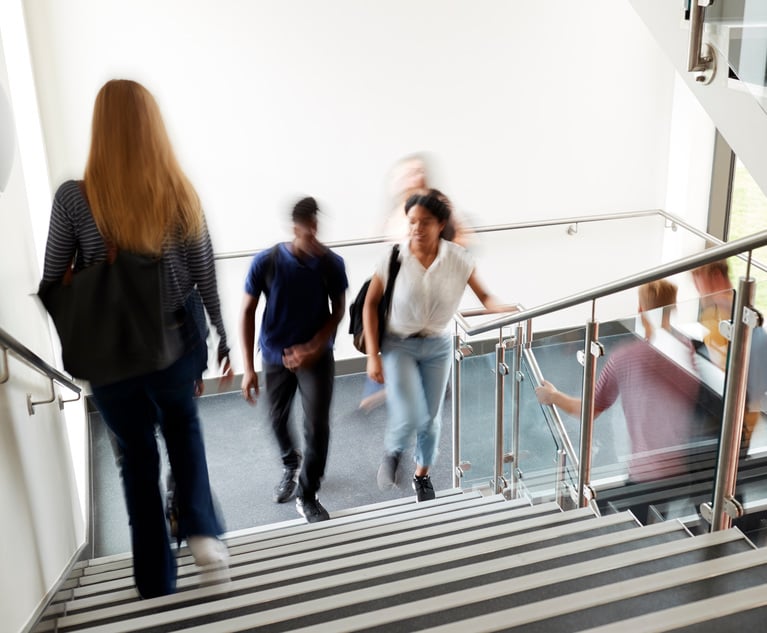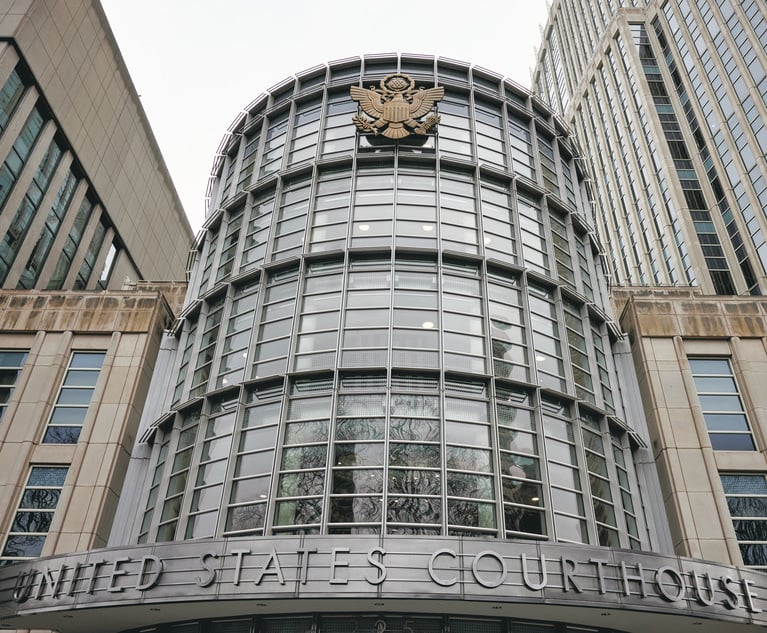Fordham, Cornell Law School Clinics Offer Coronavirus Help
From helping vulnerable clients get out of prison to assisting small business acquire government aid, law students are finding ways to pitch in amid the pandemic.
April 09, 2020 at 01:55 PM
4 minute read
The original version of this story was published on Law.com
 Photo: Diego M. Radzinschi/ALM.
Photo: Diego M. Radzinschi/ALM.
Law school clinics and programs across the country, including New York's Fordham University School of Law and Cornell Law School, have pivoted in recent weeks to focus on legal matters involving COVID-19—even as their own operations have transformed from in-person to online formats.
Their efforts involve advocating to protect the health of prison inmates and immigrant families in detention, executing wills remotely, helping small businesses buffeted by the crisis and much more.
"No matter what your subject matter is, there are COVID-related issues, so you don't need to start a COVID clinic," said Michael W. Martin, the director of clinics at Fordham Law. "In many ways, the COVID issues will come to you regardless of what you're doing because it's affecting society on such a plenary level."
Here's a sampling of how New York law school clinics and students are pitching in.
Fordham University School of Law
As coronavirus became a serious threat in U.S., Fordham's Federal Litigation Clinic sprang into action. The three professors and 12 students in the clinic immediately began reaching out to clients in prison, as well as their families, to determine whether they have any underlying conditions that make them especially vulnerable to the COVID-19. That work has been made all the more difficult as prisons have closed to all visitors, including lawyers, and prisoners have had increasingly less access to phone calls, said clinic director Michael W. Martin.
"COVID, in and of itself, has not been deemed worthy of emptying the prisons," Martin said in an interview Thursday. "You are going to need COVID-plus, which goes to increased susceptibility for a particular person, or the circumstances are such that the person is so close to release that we should consider releasing they early."
Since then, the clinic—like other federal litigation clinics—has been petitioning for bail, compassionate release, or early release for at-risk clients. Part of that work involves reaching out to prosecutors to determine whether or not they will oppose those measures. The clinic has enjoyed some early success in those efforts.
"There is no question that our students are engaged in this topic," Martin said. "They are trying to get people out of prison and they feel like life and death is at stake."
Cornell Law School
Cornell law school's clinics are tackling myriad legal aspects of the coronavirus outbreak, from helping business owners and advocating for the release of immigrant families held in detention.
The work of the school's Estate Planning Practicum is especially timely, given the mounting death toll of COVID-19. The practicum's three adjunct professors and students scrambled to create a system to execute wills remotely for low-income clients in Tompkins County, where Cornell is located. Not only can clients not come in person to the clinic, but the professors and students are now scattered across the country with the university shut down.
"They could have said, 'Sorry, we can't finish your will and we'll call you when this is all over,'" said Beth Lyon, the school's clinical director. "But they know that having a will is especially important at a time like this, so the faculty, students and community partners are bending over backward to get this done. As lawyers and lawyers in training, we have a privilege and a special responsibility to extend our efforts to mitigate inequality as this crisis unfolds."
NOT FOR REPRINT
© 2024 ALM Global, LLC, All Rights Reserved. Request academic re-use from www.copyright.com. All other uses, submit a request to [email protected]. For more information visit Asset & Logo Licensing.
You Might Like
View All
NY Appellate Panel Cites Student's Disciplinary History While Sending Negligence Claim Against School District to Trial

'No Evidence'?: Big Law Firms Defend Academic Publishers in EDNY Antitrust Case
3 minute read
'Substantive Deficiencies': Judge Grants Big Law Motion Dismissing Ivy League Price-Fixing Claims
3 minute read
Lippman Study on Antisemitism at CUNY Weighs Free Speech, Unprotected Acts
Trending Stories
- 1Call for Nominations: Elite Trial Lawyers 2025
- 2Senate Judiciary Dems Release Report on Supreme Court Ethics
- 3Senate Confirms Last 2 of Biden's California Judicial Nominees
- 4Morrison & Foerster Doles Out Year-End and Special Bonuses, Raises Base Compensation for Associates
- 5Tom Girardi to Surrender to Federal Authorities on Jan. 7
Who Got The Work
Michael G. Bongiorno, Andrew Scott Dulberg and Elizabeth E. Driscoll from Wilmer Cutler Pickering Hale and Dorr have stepped in to represent Symbotic Inc., an A.I.-enabled technology platform that focuses on increasing supply chain efficiency, and other defendants in a pending shareholder derivative lawsuit. The case, filed Oct. 2 in Massachusetts District Court by the Brown Law Firm on behalf of Stephen Austen, accuses certain officers and directors of misleading investors in regard to Symbotic's potential for margin growth by failing to disclose that the company was not equipped to timely deploy its systems or manage expenses through project delays. The case, assigned to U.S. District Judge Nathaniel M. Gorton, is 1:24-cv-12522, Austen v. Cohen et al.
Who Got The Work
Edmund Polubinski and Marie Killmond of Davis Polk & Wardwell have entered appearances for data platform software development company MongoDB and other defendants in a pending shareholder derivative lawsuit. The action, filed Oct. 7 in New York Southern District Court by the Brown Law Firm, accuses the company's directors and/or officers of falsely expressing confidence in the company’s restructuring of its sales incentive plan and downplaying the severity of decreases in its upfront commitments. The case is 1:24-cv-07594, Roy v. Ittycheria et al.
Who Got The Work
Amy O. Bruchs and Kurt F. Ellison of Michael Best & Friedrich have entered appearances for Epic Systems Corp. in a pending employment discrimination lawsuit. The suit was filed Sept. 7 in Wisconsin Western District Court by Levine Eisberner LLC and Siri & Glimstad on behalf of a project manager who claims that he was wrongfully terminated after applying for a religious exemption to the defendant's COVID-19 vaccine mandate. The case, assigned to U.S. Magistrate Judge Anita Marie Boor, is 3:24-cv-00630, Secker, Nathan v. Epic Systems Corporation.
Who Got The Work
David X. Sullivan, Thomas J. Finn and Gregory A. Hall from McCarter & English have entered appearances for Sunrun Installation Services in a pending civil rights lawsuit. The complaint was filed Sept. 4 in Connecticut District Court by attorney Robert M. Berke on behalf of former employee George Edward Steins, who was arrested and charged with employing an unregistered home improvement salesperson. The complaint alleges that had Sunrun informed the Connecticut Department of Consumer Protection that the plaintiff's employment had ended in 2017 and that he no longer held Sunrun's home improvement contractor license, he would not have been hit with charges, which were dismissed in May 2024. The case, assigned to U.S. District Judge Jeffrey A. Meyer, is 3:24-cv-01423, Steins v. Sunrun, Inc. et al.
Who Got The Work
Greenberg Traurig shareholder Joshua L. Raskin has entered an appearance for boohoo.com UK Ltd. in a pending patent infringement lawsuit. The suit, filed Sept. 3 in Texas Eastern District Court by Rozier Hardt McDonough on behalf of Alto Dynamics, asserts five patents related to an online shopping platform. The case, assigned to U.S. District Judge Rodney Gilstrap, is 2:24-cv-00719, Alto Dynamics, LLC v. boohoo.com UK Limited.
Featured Firms
Law Offices of Gary Martin Hays & Associates, P.C.
(470) 294-1674
Law Offices of Mark E. Salomone
(857) 444-6468
Smith & Hassler
(713) 739-1250






